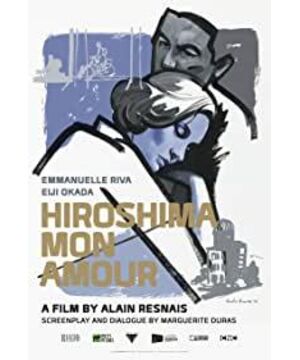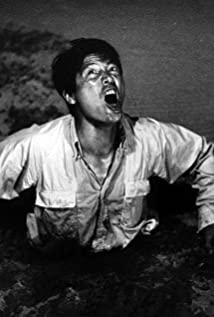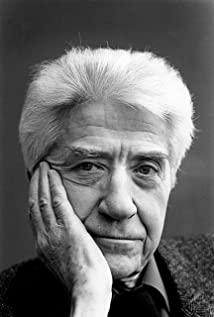1959 was the most glorious year in the history of French cinema and even the world cinema! Truffaut's "Four Hundred Blows", Godard's "Exhausted" and Alain Resnais' "Hiroshima Love" were released almost simultaneously, which shocked the international film industry. ("Four Hundred Blows" won the Best Director Award at the Cannes Film Festival; "Exhausted" won the Best Director Award at the West Berlin Film Festival; "Hiroshima Love" won the Cannes Film Festival Special Critic Award.)
Renai is undoubtedly a "left bank" 's leader. In Western film critics, he is as famous as Godard. In this film written by Marguerite Duras, a general of the French neo-novel school, he used a bold and novel narrative technique for the first time, alternately editing the real time and space and the inner world, opening the "psychological structure time and space" It is the first of its kind and has become a milestone in the development of film narrative language. "Hiroshima Love" truly realized the marriage of literature and film for the first time, opened up and occupied a commanding height that can guide the direction of "art film" for "writer's film" in the field of art, and expanded the space of film narrative language. It had a profound impact on the development of the film.
"Hiroshima Love" uses a time-space interlaced modernist cinematic approach to reflect the horrors of war and the importance of forgetting through a symbolic love story. The film describes the French actress Emmanuelle Rive who went to Hiroshima, Japan in 1957 to shoot a film promoting peace. Before returning home, she met a Japanese man, Eiji Okada. The two fell in love and had an extramarital affair. The appearance of Eiji Okada reminded Emmanuelle of her love affair with a German occupying army in the small French town of Neville during the war. In the end, the German man was killed, and Neville was freed overnight. Emmanuelle also sunk into endless madness...
"He slowly became cold beside me, but he died so slowly... I really can't remember the moment of his death, because, not only at that time, but later, I can only say, All I can say is that between the corpse and my body, I can't really find any difference, only between the corpse and my body--similarity, harmony-that's me My first love." She told the Japanese man in front of her, "It's been 14 years," she touched his hands, "I forgot how these hands were, and I only remember a little of the pain." The man asked: "What about tonight?" "I remembered tonight," she said. "I will not remember it again, I will forget it all. I will be thousands of kilometers away from you at this time tomorrow." He hugged her: "In a few years, I will forget you, and other things like this will happen because of those long-standing habits. I will treat you as a forgotten old love, remember you, I I will blame myself for being forgetful and remembering these things, I have long understood..."
"It's terrible, I can't remember you clearly anymore, I'm starting to forget you. Terrible! Such a deep love can be forgotten!" What can we not forget? The devastation of war? Unforgettable love? "Here, people in Hiroshima don't like watching dramas about peace anymore." The trauma of war can't make people remember the faults of history forever, just like the atomic bomb that caused the disaster of war, "This is the masterpiece of human scientific geniuses, unfortunately Yes, the political wisdom of human beings is a hundred times lower than the development of scientific wisdom." How long can the call to stop nuclear weapons testing be heard? Forgetting history means betrayal, and forgetting love? Out of the pain of losing a German man, out of Nivel, out of the Nova, she also out of her eternal happiness. Should it be forgotten? Memory is madness, but forgetting is sober? When she met this Japanese man (also an enemy of fascism!), she was once again on the verge of madness, should she accept it or avoid forgetting it again? This time, she was in deep confusion. She longed for the love of this man who made her infatuated, and she wanted to commemorate her past joy and pain? Or must she insist on using her reason to keep herself awake? Refusing to remember is forgetting, forgetting is betrayal, and once again falling into madness is a double betrayal of the spirit and the body of the two men (the deceased German soldier and his husband)? She is caught in a dilemma, the paradox of memory and forgetting. Memories are so painful that one has to forget. The atomic bomb memorial in Hiroshima has repeatedly reminded people that forgetting means betrayal and history repeating itself. Should we forget, or should we remember our own history? Human beings are struggling to find their own living space in these two difficult choices.
Memory is beautiful. Memory means entering into the past. The past of the past represents chaos, such as the turbulent body of a woman and the moist wet place, the most primitive madness and sin. People need rational forgetting and sensory recalling. We must refuse to forget in order to go back to the past and experience madness; we must forget madness in order to move towards the future, in order to enjoy sobriety.
Enter! The video starts from the moment you enter! Men enter women's bodies, women enter forgotten memories! Hiroshima men madly possessed the sinful bodies of French women, and French women desperately possessed the streets, museums, and sufferings in the memory of Hiroshima. They are intertwined, and their carcasses are enough to stop time! The montage continues to cut from their naked bodies (living bodies) to war wrecks (inanimate corpses). Desire and reason begin to intertwine again and again, and men and women struggle on the edge of life and death. "No, you haven't been there... You haven't seen it, you don't understand." Hiroshima refused the woman's invasion; the man said, "We'll meet again." "No." The woman answered simply. "Why?" The man tried to enter again. "You go, leave me!" The woman rejected the man's invasion again. "Stay...a week?...three days?..." "Why stay, to live, or to die?" "I really hate that you didn't die in Nivel..." "Is the night in Hiroshima endless? "Yes, the dark night in Hiroshima has no end!" "I like this..." It seems that people can never overcome reality; life or death, this is a question. There is never an answer to this question, even if the woman evokes memories of the past, the man is ecstatic to enter the woman's privacy, and the ending of the film can only be vague and uncertain. Will women ever leave Hiroshima? Nobody knows.
"Love of Hiroshima" presents a complex and ambiguous form from content to form. From the theme of the film, whether it is "love", "anti-war", or about "time and forgetting", "reason and emotion", the definition of this issue by film critics seems to be incompatible with these 90 minutes of time and space. Interlacing gives a simple and clear label, and various interpretations cannot fully explain the theme of the film. Perhaps this is the value of the film. In the words of director Renai, the film is based on contradictions, including the inevitable, terrifying contradiction of forgetting, between the poignant and small fate of an individual who emerges against the backdrop of a collective, great tragedy. The contradiction of the film ... and the argument about the theme of the film itself is meaningless, "We ask the audience not to reconstruct the story from the outside, but to experience it from the inside with the characters... Reality is never external, not entirely internal, It's a mixture of the two types of feeling and feeling."
Reality is never external, nor is it all internal. Existentialism believes that the world cannot be grasped by human reason, it is a mass of "nothingness". Alain Resnais' films use existential philosophy and psychoanalytic theory to reveal various psychology and behaviors of people in life, use the interlacing of real time and space with psychological time and space, and conduct in-depth and meticulous exploration of the inner world of the characters, practice and develop Pakistan Zan's realist film aesthetics, that is, "psychological realism" in the strict sense of grasping and reproducing reality with intuitive perception. This "uncertain" film aesthetic has directly influenced the creation of many modern directors, and film theorists have returned to Andre Bazin's most profound question about film: what is film?
View more about Hiroshima Mon Amour reviews











